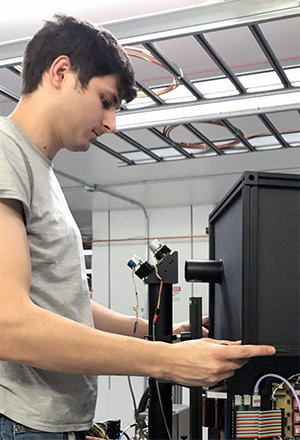
The American Physical Society (APS) has awarded Ihar Lobach its 2022 Outstanding Doctoral Thesis Research in Beam Physics Award. Cited for “outstanding research contributions to our understanding of undulator radiation fluctuations, and for developing an experimental method to determine electron beam properties from these fluctuations,” Lobach conducted his thesis research at the U.S. Department of Energy’s (DOE’s) Fermi National Accelerator Laboratory. Lobach has now begun his postdoctoral appointment with the Accelerator Systems Division’s Accelerator Operations and Physics Group, headed by Yine Sun, at the Advanced Photon Source, a DOE Office of Science user facility at Argonne National Laboratory. His research focuses on applications of machine learning for accelerator tuning, control, and anomaly detection.
The APS annual Outstanding Doctoral Thesis Research in Beam Physics Award recognizes doctoral thesis research of outstanding quality and achievement in beam physics and engineering. The award comes with $2,500, a certificate and travel reimbursement up to $500. Lobach will also receive a registration waiver to receive the award and present at the April 2022 meeting of the APS Division of Physics of Beams.
After receiving his bachelor’s degree in physics from the Belarusian State University in 2017, Lobach matriculated at the University of Chicago and joined the Fermilab accelerator Ph.D. program in 2018. He completed his doctoral degree in particle accelerator physics at the University of Chicago in 2021. A former summer intern in what is now known as the Helen Edwards internship program, Lobach returned to Fermilab to conduct his thesis research at the Lab’s Integrable Optics Test Accelerator, or IOTA, storage ring, under the guidance of Sergei Nagaitsev, head of accelerator science programs and professor at the University of Chicago, and Giulio Stancari, senior scientist. He studied the statistical properties of the undulator radiation generated by a bunch of electrons and by a single electron circulating in the ring.
Lobach is also the recipient of the 2021 University of Chicago Nathan Sugarman Award for Excellence in Graduate Research.
The original Fermilab article can be read here.
The Advanced Photon Source is a DOE Office of Science User Facility operated for the DOE Office of Science by Argonne National Laboratory under Contract No. DE-AC02-06CH11357
The U.S. Department of Energy's APS at Argonne National Laboratory is one of the world’s most productive x-ray light source facilities. Each year, the APS provides high-brightness x-ray beams to a diverse community of more than 5,000 researchers in materials science, chemistry, condensed matter physics, the life and environmental sciences, and applied research. Researchers using the APS produce over 2,000 publications each year detailing impactful discoveries, and solve more vital biological protein structures than users of any other x-ray light source research facility. APS x-rays are ideally suited for explorations of materials and biological structures; elemental distribution; chemical, magnetic, electronic states; and a wide range of technologically important engineering systems from batteries to fuel injector sprays, all of which are the foundations of our nation’s economic, technological, and physical well-being.
Argonne National Laboratory seeks solutions to pressing national problems in science and technology. The nation's first national laboratory, Argonne conducts leading-edge basic and applied scientific research in virtually every scientific discipline. Argonne researchers work closely with researchers from hundreds of companies, universities, and federal, state and municipal agencies to help them solve their specific problems, advance America's scientific leadership and prepare the nation for a better future. With employees from more than 60 nations, Argonne is managed by UChicago Argonne, LLC, for the U.S. DOE Office of Science.
The U.S. Department of Energy's Office of Science is the single largest supporter of basic research in the physical sciences in the United States and is working to address some of the most pressing challenges of our time. For more information, visit the Office of Science website.
